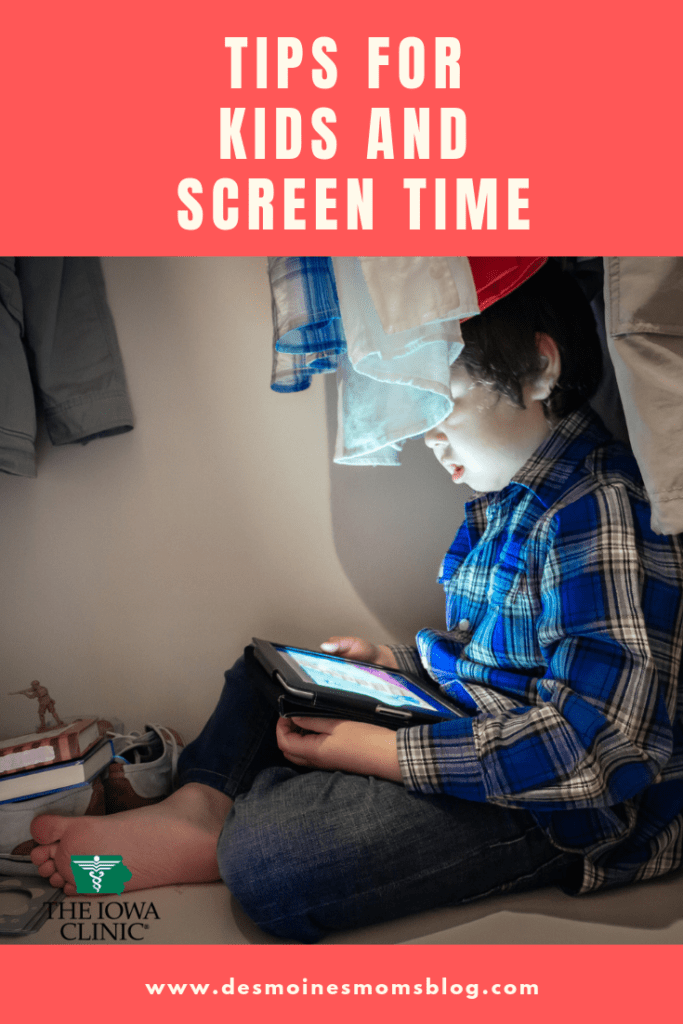That’s how much time the average child spends in front of a screen, whether it’s a TV, tablet, phone, computer or gaming device.
It’s a lot of screen time for anyone — even adults who spend the bulk of their days in front of a laptop or computer monitor at the office. And it’s having an effect on the health of our children.
“In addition to displacing physical activity, it promotes other unhealthy behaviors,” says Daniel Pelzer, M.D., a pediatrician at The Iowa Clinic’s West Des Moines Campus. “Sitting in front of a TV or computer can increase snacking. Late-night screen time often interferes with sleep. Combined with physical inactivity, these behaviors promote childhood obesity and the health risks that come with it.”
With every device becoming “smart” and internet-connected, what your child does in that screen time can put them even more in harm’s way.
4 Ways to Protect Kids from Dangers of Screen Time
1. Limit screen time.
Screens aren’t all bad. For children over the age of two, screen time unlocks educational opportunities and engages their developing minds. Because of these benefits, the American Academy of Pediatrics (AAP) Recommendations for Media Use don’t count homework in their screen time calculations.
For everything else, limits are essential. The AAP recommends:
- No screens for babies 18 months and younger.
- Introducing limited, supervised, educational screen time to your child between 18 and 24 months.
- Less than an hour a day for kids ages two to five. Think Sesame Street or the high-quality children’s programming on PBS, Dr. Pelzer says. Or let them interact with their grandparents or family over video chats.
- Consistent limits for media use and the types of media for children six and up. Screen time should never disrupt sleep, replace physical activity or affect other behaviors essential to health.
“One study showed that children who exceeded the screen-time guidelines had 1.69 times the odds of being overweight or obese compared to those who met the guidelines,” Dr. Pelzer says. “A child who has regular physical activity will have better cardiorespiratory fitness, stronger bones and muscles, higher energy levels, an enhanced sense of emotional well-being and better weight control. Their risk of obesity and a variety of other diseases is much lower.”
 2. Monitor what they do with their screens.
2. Monitor what they do with their screens.
Quality is just as important as quantity. The AAP emphasizes high-quality programming and co-viewing with your kids. In the early years, children will have a lot of questions. Watch TV and explore approved apps together to help them understand what they’re looking at — and to keep you in the loop on what they’re doing.
As they get older, it’s a little bit harder. Older children are more independent and more likely to have devices of their own. You can still exercise your parental controls — many devices, apps and social media networks have them. You can adjust the settings to ensure your children stay within their allotted screen time and spend it on apps you approve of. Or download an app like Pocket Guardian or Circle to help you keep tabs on your kids.
Maintain the same level of involvement once they become teenagers and are able to set up social media accounts — or earlier if they manage to set up an account while under the app’s age restrictions.
“Continue monitoring their activity. Join any network your child uses. If you see something that concerns you, have a conversation about it,” Dr. Pelzer advises.
3. Teach kids about internet dangers.
Most conversations and resources about screen time highlight the amount of time your children should spend in front of a screen. One critical yet overlooked AAP recommendation states that you should “have ongoing communication about online citizenship and safety, including treating others with respect online and offline.”
“When parents are involved in their kids’ online lives, kids are less likely to be negatively impacted by things they see online,” Dr. Pelzer adds. “As soon as they pick up an electronic device, talk with them about what they’re doing and ask them to show you how to use apps they like. Carefully monitor their online connections and help them understand why it’s never a good idea to connect with people they don’t already know.”
Your actions serve as education too. When you’re on the same social networks and connected with your kids online, you have to model good online behavior. Be kind, avoid oversharing, practice healthy media habits and do everything else you’re expecting of them.
 4. Create a family media plan.
4. Create a family media plan.
Setting limits, monitoring activity, providing education — that’s a lot of extra work for a busy mom to handle. A personalized family media plan can help you manage it all.
The AAP launched a tool alongside their media use guidelines in 2016. You can create a media use plan for each member of your family that outlines time limits as well as time investments. You can make rules for media use and develop goals for reducing the amount of time everyone spends in front of a screen.
Having a plan outlined for everyone in your family sets clear expectations and establishes accountability. You can keep better tabs on your children’s screen time — and your own. Everyone can make thoughtful decisions about how they prioritize their online activity and start to place greater emphasis on the offline activities that have a more positive impact on health.
About Dr. Pelzer
Daniel Pelzer, MD has been practicing as a board-certified pediatrician in the Des Moines area since 2015. He received his medical degree from the University of Iowa and completed his residency at the University of Iowa Stead Family Department of Pediatrics.
He and his wife enjoy outdoor adventures with their 10-pound poodle mix named Moose. Dr. Pelzer also likes running, exploring new places, watching sports and cooking.
 Connect with The Iowa Clinic
Connect with The Iowa Clinic
Facebook: www.facebook.com/IowaClinic
Twitter: twitter.com/theiowaclinic
YouTube: www.youtube.com/user/TheIowaClinic
LinkedIn: www.linkedin.com/company/the-iowa-clinic-p.c.


















